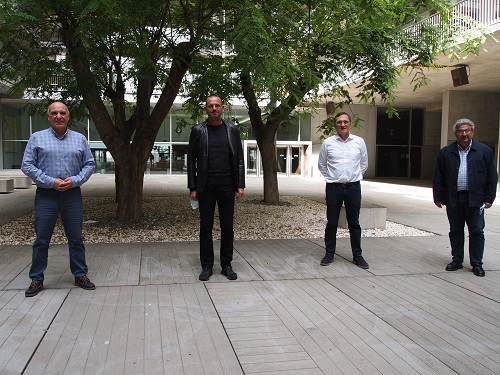
8th October, 2020 - Press notes
A study by researchers from Hospital del Mar and the Hospital del Mar Medical Research Institute reveals the protective effect that 30 minutes of moderate physical activity per day can have, as recommended by the World Health Organisation. Multiplying this figure by four maximises the benefit, but, beyond this, there is no additional benefit. The study, published by the Revista Española de Cardiología (Spanish Journal of Cardiology), has been monitoring over 11,000 people for more than 7 years.
Doing 150 minutes of moderate-intensity physical activity (fast walking or dancing, for example) or 75 minutes of vigorous activity (running or other sports) a week, as recommended by the World Health Organisation (WHO), reduces your mortality risk by 16%. At the same time, cardiovascular mortality risk drops by 27% and cardiovascular event risk falls by 12%. This is highlighted in a study published by the Revista Española de Cardiología led by doctors from Hospital del Mar and researchers from the Hospital del Mar Medical Research Institute (IMIM), the University of Vic-Central Catalonia (UVic- UCC), and the CIBERCV and CIBERESP.

Left to right, Dr. Jaume Marrugat, Dr. Helmut Schröder, Dr. Roberto Elosua, Dr. Albert Clarà
The work also reveals that doing three to five times more physical activity than the recommended amount maximises the benefit. Beyond this, no additional benefit has been observed. As Dr. Albert Clarà, first author of the study, head of the Vascular Surgery Service at Hospital del Mar and IMIM-CIBERCV researcher, explains, "The specific question we wanted to answer was, what are the minimum and maximum amounts of physical activity that optimise cardiovascular health benefits?".
The study tracked 11,158 people for more than 7 years, all from the REGICOR study (Register Gironí del Cor). The physical activity data of the participants, people aged 25-79, was collected using validated questionnaires, specifying up to 64 types of activity, and all the participants underwent follow-up. Cardiovascular events and mortality (863 people died during the study) were identified from these contacts and by cross-checking the data with the Generalitat's Health Departament research and innovation in health data analysis program (PADRIS).
Dr. Helmut Schröder, one of the authors of the study and a researcher at IMIM-CIBERESP, pointed out that "The results of the study indicate that moderate to vigorous physical activity is associated with a lower risk of cardiovascular disease and mortality." Likewise, Dr. Jaume Marrugat, also an author of the study and a researcher at the IMIM-CIBERCV, notes that the most interesting result "Is the fact that the benefit is observed even with small quantities of physical activity. Following the current WHO recommendations is associated with a 12% reduction in the risk of suffering from cardiovascular disease and a 16% reduction in the risk of dying." In fact, "the greatest benefit is observed when doing four times the recommended amount, with no additional benefit being seen when increasing physical activity above this level." No differences were observed with regard to age or gender.
Lack of physical activity is estimated to be responsible for 6% of cardiovascular disease, 7% of diabetes and 9% of premature death. It is also estimated that one in four European adults do not follow WHO recommendations on physical activity, this figure being 35% in Spain.
In view of this, the results of the study lead Dr. Roberto Elosua, the last author of the work and an IMIM-CIBERCV-UVic-UCC researcher, to stress "the importance of promoting a study on healthy living that incorporates the practice of physical activity to prevent cardiovascular diseases." The authors indicate that "Doing physical activity is not just an individual decision, but also requires the commitment of the public sector (town councils and other authorities), to facilitate the population's access to environments where these activities can be done easily, both in urban and rural settings."
The project was funded by grants from the Generalitat de Catalunya and the Instituto de Salud Carlos III, as well as ERDF funds.
Albert Clará, Georgina Berenguer, Silvia Pérez-Fernández, Helmut Schröder, Rafel Ramos, María Grau, Irene R Degano, Alba Fernández-Sanlés, Jaume Marrugat, Roberto Elosua. Análisis de la relación dosis-respuesta entre actividad física recreacional y eventos cardiovasculares y mortalidad por todas las causas: el estudio REGICOR. Rev Esp Cardiol;2020 [Epub ahead of print].
Parc Salut Mar
Passeig Marítim 25-29 Barcelona 08003
See location on Google maps
Phone: 93 248 30 00 · Fax: 93 248 32 54
Information request
© 2006 - 2025 Hospital del Mar · Legal notice and Privacy Police | Cookie Policy | Accessibility